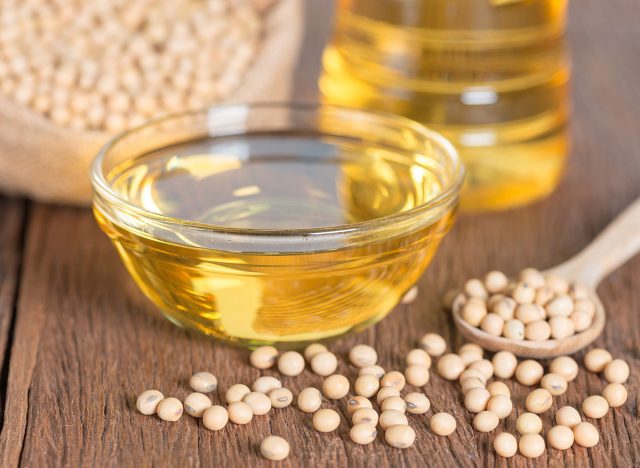Your gut is one of the most important parts of your body, as it breaks down what you eat and drink and absorbs the nutrients from the foods you consume. Because the gut is one of the primary points of contact with what you put in your body, it plays an enormous role in how nutrients are used for your body’s essential functions. This is why your diet is so important in maintaining gut health. In fact, there are plenty of healthy foods that can support gut health, but there are also a number of foods that are terrible for your gut.
Your gut isn’t just comprised of your digestive system, although that’s a major part of it. It is also the home of the gut microbiome, which is the collection of trillions of bacteria and microbes that live in a part of your large intestine called the cecum. This microbiome contains a delicate balance of both beneficial and harmful bacteria, and when it is in balance, should be functioning properly. However, certain dietary factors, such as excess sugar, salt, fat, and alcohol, can alter the gut microbiome and throw the bacteria off balance. When your gut microbiome is off balance, it can negatively impact things like your immune system, digestion, and mental health.
In order to help you take care of your gut, we’ve put together a list of some of the worst foods for your gut health and microbiome. Many of the foods and drinks on this list are fine in moderation, so you don’t need to avoid them altogether. However, when they’re consumed in excess, they can negatively alter the balance of your gut.
Continue reading to learn about some of the popular foods that may be wrecking your gut health. And for more healthy eating tips, make sure to check out 9 Best Supplements for Reducing Inflammation.


Fast food can save you time and money, and—let’s face it—it tastes amazing too. But unfortunately, fast food is one of the worst foods for your gut health and microbiome.
One study published in Gut found that fast food was linked to increased levels of certain bacteria in the gut (Blautia, Lachnospiraceae bacteria, and Clostridium bolteae), which led to an imbalance of bacteria in the gut. The study also found that because of this imbalance, fast food consumption was also linked to Crohn’s disease, IBS, and ulcerative colitis (a type of inflammatory bowel disease).
Another study published in Immunometabolism found that just one fast-food meal may have the ability to alter the gut microbiome, but because this study was performed on mice, more research needs to be done to make conclusions about the human gut.


Along with fast-food, high-sugar foods are one of the leading culprits of diet-related gut issues. This is why it’s best for your gut health to limit the number of processed baked goods you consume on a regular basis, such as donuts, packaged muffins, cookies, cakes, etc.
A 2020 report published in Nutrients concluded that eating high-sugar foods can create more Proteobacteria and decrease your levels of Bacteroidetes, causing an imbalance in your microbiome. The report states that because of these disruptions, too much sugar can also lead to an increased risk of low-grade inflammation.


Too much sugar can impact the health of your gut, but more and more research is being released about the negative impact that too much salt can have as well. In fact, many experts have found a connection between the gut microbiome and hypertension (high blood pressure).
According to the American Journal of Physiology, diets that are higher in sodium can lead to increased tissue and intestinal inflammation, and too much sodium may alter the gut microbiome. Another study, which was published in JCI Insight, confirmed that there is a connection between higher sodium intake and lower diversity of the microbiome.
The American Journal of Physiology also states that multiple animal studies have confirmed a link between an imbalanced gut microbiota and an increased risk of hypertension, but more human studies need to be done on this particular connection.


Chances are you’ve heard talk of how red meat may increase the risk of things like heart disease. But what you may not know is that this increased risk may be associated with your gut health.
A study published in Arteriosclerosis, Thrombosis, and Vascular Biology followed 3,931 participants all above the age of 65 to see how different animal food sources affected their risk of atherosclerotic cardiovascular disease. After a follow-up of about 12.5 years, researchers found that daily consumption of red meat increased the risk of heart disease by about 22%, whereas eggs and fish had no negative effect on the heart.
Much of this increased risk was linked to the way the gut microbiome was altered by red meat—specifically with increased amounts of three types of metabolites. According to the study, these alterations in the gut were responsible for about 10% of the increased risk of heart disease in participants.


While many people may reach for artificial sweeteners to save calories and help with weight loss, these may negatively impact your gut health over time.
A study published in Nature found that consumption of artificial sweeteners may actually be linked to developing a gluten intolerance because of the ways it can alter your gut microbiota.
READ RELATED: Teeth Top 10 Best Practices For Healthy Teeth And Gums Approved By Dentists
According to a new 2023 report published in the Journal of Toxicology and Environmental Health, sucralose (also known as Splenda) was found to potentially increase your risk of metabolic disorders, as well as potentially cause damage to the lining of your gut and increase its permeability.


Although they are a good source of protein, processed meats like bacon or sausage have been known to potentially cause problems for your gut health due to their saturated fat content.
A review from Clinical Nutrition found a link between total fat intake—specifically saturated fats—and a reduction in total bacterial number, bacterial richness, and diversity in the gut, which are all signs of poor gut health.
It’s also important to note that, as we previously mentioned, a higher intake of salt is also linked to poorer gut health, and processed meats are notoriously high in sodium.


Research shows that soybean oil, which is commonly found in things like margarine, certain salad dressings, some brands of mayonnaise, nutrition bars, and many frozen foods, may be harmful to your gut health.
A study published in the journal Gut found that a diet high in soybean oil, which is rich in omega-6 polyunsaturated fatty acids, decreased levels of two bacterial species, Faecalibacterium and Blautia, that produce health-promoting metabolites. It also increased levels of two bacterial species, Alistipes and Bacteroides, which have been related to imbalanced glucose metabolism.


The effects of sugar don’t just stop at baked goods. Sugary drinks like soda can also wreak havoc on your gut health, especially when they’re consumed on a consistent basis.
According to a review published in the European Journal of Nutrition, sugar-sweetened beverages (SSBs) are associated with an imbalance of certain bacteria in the gut. A study from Gut also found that consuming SSBs in adulthood and late adolescence was linked to an increased risk of early-onset colorectal cancer in women. The study explains that one of the leading explanations for this connection has to do with the way added sugar can erode the gut barrier and cause greater levels of gut permeability.


Alcohol can be enjoyed every once in a while without too many consequences, but according to registered dietitian Morgyn Clair, MS, RDN, author at Fit Healthy Momma, heavier amounts of drinking can have lasting effects on your gut health.
“Not only have certain alcoholic drinks been shown to disrupt normal digestion, but studies have shown that moderate to heavy drinkers actually have fewer healthy bacteria colonies in their digestive systems,” says Clair.
In fact, one report published in Alcohol Research Current Reviews confirmed that chronic alcohol use can alter gut diversity, increase permeability, and increase inflammation.


Similarly to soda, sugary juices can also wreak havoc on your gut health due to their large amounts of added sugar. This applies to store-bought juices that come with excess sugar added, not natural juice that is made with 100% fruit juice.
“Too much sugar can ‘feed’ the bad bacteria, which can compete for survival with the good bacteria,” says Clair, “and too much sugar can also cause an influx of water and disrupt normal digestion, causing bloating and other unwanted effects.”
In addition to the studies we mentioned above on how sugar can affect your gut, a recent study on mice found that too much sugar can lower the amount of immune cells in the body, as well as create a larger imbalance in the gut microbiome.
A previous version of this story was published on December 16, 2021. It has been updated to include additional copy and proofreading revisions, additional research, and updated contextual links.








